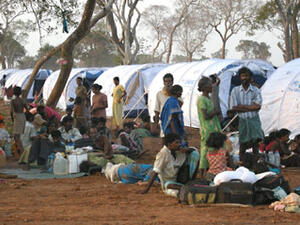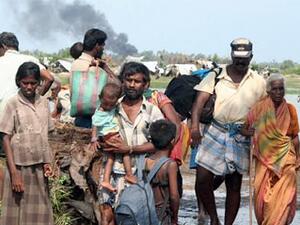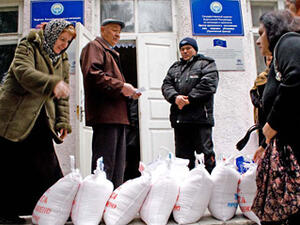Top UNHCR official urges refugees in Nepal to be patient a bit longer
Top UNHCR official urges refugees in Nepal to be patient a bit longer

A top UNHCR official has told refugees from Bhutan, like these women in a camp in eastern Nepal, to be patient a bit longer.
BELDANGI REFUGEE CAMP, Nepal, 20 July (UNHCR) - A top UN refugee agency official on Thursday begged "frustrated and depressed" refugees from Bhutan in Nepal to be patient because there is now increased hope that their 15 years in exile could be coming to an end.
"I wish to plead with you to be patient for a little bit longer," UNHCR's Assistant High Commissioner for Operations Judy Cheng-Hopkins told refugee leaders in this camp in the far east of Nepal. "We may be nearing a solution but we need you to be patient with us," she said on the last leg of a three-nation tour of Asia.
"Please have faith in us. We are doing everything we can to bring your plight to the attention of the international community," she told leaders of more than 18,000 refugees in this camp, part of the nearly 107,000 people of Nepali ethnic origin forced to flee Bhutan in the early 1990s. They now live in seven refugee camps in this Himalayan country.
Three possible solutions for the refugees, said Cheng-Hopkins, include return to their own country - which elderly refugees and their leaders favour - integration into Nepalese society, or resettlement in a third country. Fifteen years of bilateral negotiations between Bhutan and Nepal over the fate of the refugees have so far produced few results.
After hearing refugee leaders say people in Beldangi-I refugee camp are "depressed" and "frustrated," at spending 15 or 16 years in the camp with no realistic prospect of going home, Cheng-Hopkins said: "We are well aware of your frustrations, and we really, really hope that in the not too distant future we will be able to solve a good many of your problems."
She said she was reassured by her talks with the Nepalese government, talks which continue in the capital, Kathmandu, on Friday. "There's no question that they see your problem, the refugee problem, as a priority of the government," she said about the new administration of this country of 26 million people.
Amid rumours of radicalisation of youth in the camps, Cheng-Hopkins appealed strongly to the refugee leaders to maintain peace and calm to avoid spoiling their chances of repatriation, local integration or resettlement.
One middle-aged refugee man told Cheng-Hopkins that teenagers born in refugee camps know nothing of Bhutan and their ancestral lands. "We are risking entirely losing the memory of our homeland back in Bhutan," he said.
Cheng-Hopkins assured refugees that UNHCR is trying its best to address their concerns - they highlighted lack of cooking fuel and problems with school buildings - but said the refugee agency is constrained by an overall lack of funds. "UNHCR is doing its very best to make sure to provide for every one of you." But, she added later: "it's all about belt-tightening these days."
By Kitty McKinsey in Beldangi Camp, Nepal









